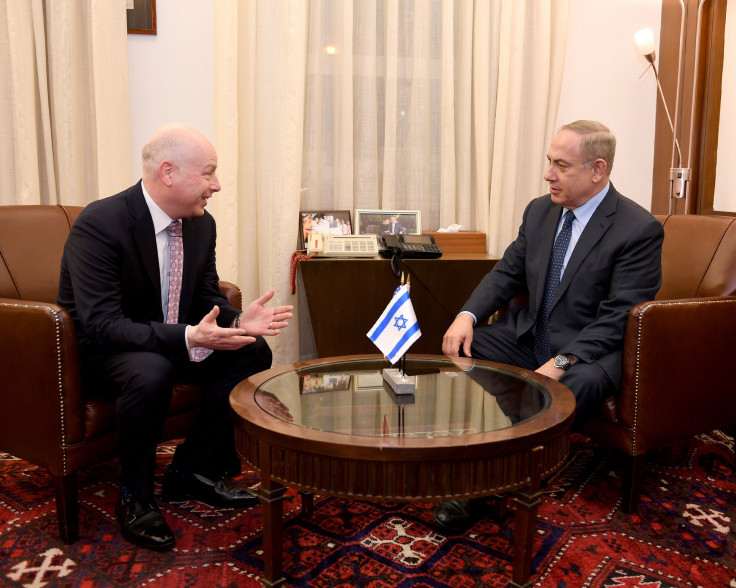Can Israel-Palestine Conflict Be Resolved? Trump Envoy Optimistic Regarding Peace Prospects

U.S. President Donald Trump’s international negotiator is expressing optimism on the prospects for a peace deal between Israel and the Palestinians.
Jason Greenblatt, Trump’s special representative for international negotiations, made the rounds this week, meeting with Israeli officials, Jordanian King Abdullah II, who pledged to do everything possible to advance peace efforts, and Palestinian leader Mahmoud Abbas as the U.N. issued a report highly critical of Israel's treatment of the Palestinians.
After the meeting with Abbas, which also was attended by PLO Executive Committee Secretary-General Saeb Erekat, who has acted as the chief negotiator with Israel, Greenblatt tweeted the encounter had been “positive.”
Trump has said he wants to achieve the “ultimate deal” between Israel and the Palestinians and is not married to a two-state solution, the so-called roadmap to peace pushed by the U.S. and European allies have been pushing for years. Israeli Prime Minister Benjamin Netanyahu has said he supports a two-state solution but talks on the plan broke down in 2014.
Read: Bank Expansion Undermines Peace Efforts, US Official Tells Israel
Palestinians object to Israeli settlement construction in the West Bank and have made an end to construction a condition for resuming talks. Israelis want an end to Palestinian violence but have not set any conditions for resuming negotiations.
Israel unilaterally pulled out of the Gaza Strip, which was captured along with the West Bank in the 1967 war, in 2005, but since then, militants have been using the territory as a staging area for rocket attacks on southern Israel.
Read: Pakistan Defense Minister Threatens Israel In Response To Bogus Story
Among the issues standing in the way of an agreement are the status of Jerusalem, which both sides claim as their capitals, the Palestinian refugees’ right of return, final borders and Arab recognition of Israel’s right to exist.
“I’m looking at two-state and one-state, and I like the one that both parties like. ... I can live with either one,” Trump told a joint White House press conference with Netanyahu on Feb. 15.
At their meeting in Ramallah Tuesday, Greenblatt and Abbas discussed the Palestinian economy, which currently has a gross domestic product of $300 million annually compared to Israel’s $12 billion, the Jerusalem Post noted.
A statement issued after the meeting said Abbas pledged to “create an atmosphere conducive to making peace and would heighten his outreach efforts to the Israeli public.”
Readout of Palestinian Authority Pres. Mahmoud Abbas' Meeting with US Special Representative for International Negotiations @jdgreenblatt45: pic.twitter.com/EBWak927R9
Abbas also pledged to work to de-escalate tensions by working to stem “inflammatory rhetoric and incitement.”
Trump spoke with Abbas Friday and invited him to visit the White House, but no date has yet been set.
Haaretz, quoting a source close to Abbas, said the conversation was an ice-breaker, and the two leaders didn’t discuss a future peace deal. Abbas met with CIA Director Mike Pompeo last month.
Greenblatt held a lengthy meeting with Netanyahu Monday to discuss various issues including settlement activity. There was no indication Greenblatt asked Netanyahu to cut back construction plans.
Joint Statement by U.S. Special Representative @jdgreenblatt45 and @IsraeliPM @netanyahu following their meeting: pic.twitter.com/cBUu3GnQRp
— U.S. Office of Palestinian Affairs (@USPalAffairs) March 14, 2017
During the presidential campaign, Trump pledged to move the U.S. Embassy from Tel Aviv to Jerusalem but has said little on the subject since his inauguration Jan. 20. David Friedman, Trump’s choice for U.S. ambassador to Israel, is known to favor both the move and settlement construction in the West Bank.
Arab League heads of state are to meet in Jordan March 29, and the Palestinian issue is expected to be on the agenda.
© Copyright IBTimes 2024. All rights reserved.






















